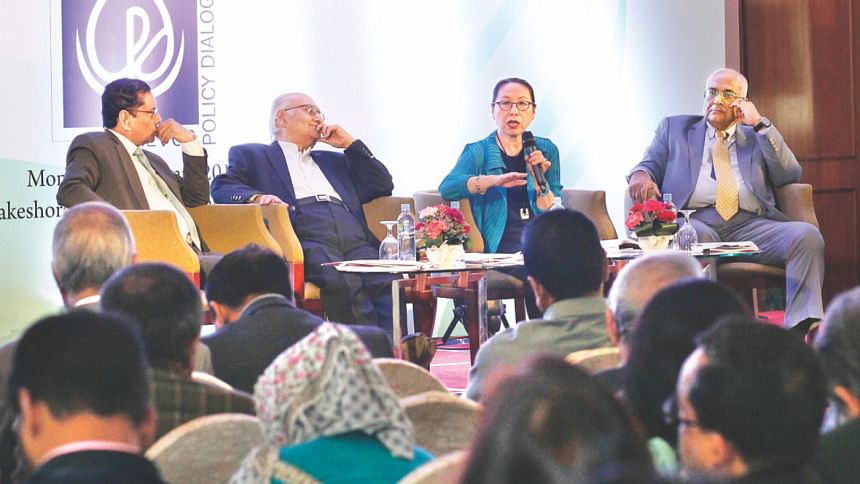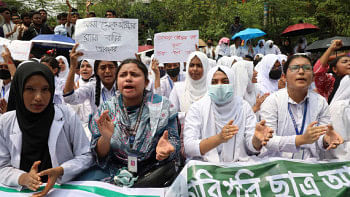Don't sign deals limiting access to life-saving drugs

A leading UN official has advised Bangladesh to be cautious before signing any bilateral or multilateral trade agreements that may undermine national policies and people's access to life-saving drugs.
Today's trade agreements contain extensive provisions that regulate the market environment for investors and exporters and affect public procurement, investor-state dispute settlement (ISDS) and intellectual property rights, said Prof Sakiko Fukuda-Parr, vice chair of the UN Committee for Development Policy.
“Such rules can constrain the scope of action that national governments have in pursuing their respective national priorities,” she said, mentioning rising prices of essential drugs that are often not accessible by low-income people.
Fukuda delivered the third CPD Anniversary Lecture titled “Health and global trade regime: Is it affecting equal access to medicines?” organised by the Centre for Policy Dialogue (CPD) at Lakeshore Hotel in the capital yesterday.
Her comments came at a time when the world pursues for the Sustainable Development Goals (SDGs) that, among others, target to achieve universal health coverage including access to essential healthcare and access to affordable essential medicines and vaccines for all.
In Bangladesh, households spend 63 percent of the total national health expenditure. High private healthcare expenditure pushes 4 to 5 million people into poverty every year, while many fail to access healthcare.
Fukuda-Parr, who teaches international affairs at The New School in New York, was the lead author of a number of UNDP Human Development Reports. She has been an influential voice in advocating the interests of developing countries in global discourse.
Fukuda-Parr said the intellectual property provisions in the agreements like that of Trans-Pacific Partnership, or TPP (the US recently pulled out of the trade deal) strengthen and lengthen patents, giving pharmaceutical corporations new monopoly rights to charge high prices.
The corporations impose standards to fit their own priorities and conditions, which reduce the scope for the policymakers in formulating national policies, she said.
Even such agreements have provisions for special tribunals outside national legal systems for foreign corporations to sue governments for health policy that may get in the way of their future profits, she added.
According to a paper she presented, the prices of cancer drugs doubled over the last decade. Escalating prices of branded medicines to treat cancer, Hepatitis C and other widespread life-threatening conditions are straining budgets of governments, insurance companies and households, leaving many patients without access to these drugs.
The paper says drug-resistant viruses cause 7 lakh deaths a year globally and if unchecked, it would cause 10 million deaths by 2050. However, only one novel class of antibiotics developed in 40 years.
Besides, 26 neglected tropical diseases contribute to 14 percent of the global disease burden, but the global health-related research and development (R&D) expenditure for it was only 1.4 percent in 2013, it says.
In Bangladesh alone, 81,000 deaths occurred due to tuberculosis in 2014, while multi-drug resistant TB is emerging. However, only two new drugs for TB were developed in last 40 years, according to the paper.
Fukuda-Parr said there was a huge gap in innovation amid underinvestment due to low financial incentives for companies. These companies often inflate drug prices, arguing huge investments in research and development, but the spending was often not transparent, she said.
CPD Chairman Prof Rehman Sobhan observed that medicines should be a global public good as they were directly related to health, a critical component in SDGs.
Laying stress on public funding in research for developing new drugs, he suggested that access to life-saving drugs should be on the global human rights agenda.
“State and market can be reconciled here,” he said.
Gonoshasthaya Kendra Founder Dr Zafrullah Chowdhury said providing low-cost healthcare had become a real need of the day with the rise in non-communicable diseases like diabetes, kidney disease and hypertension.
However, dominance of businesses is causing a rise in healthcare and drug cost, he said.
CPD Executive Director Dr Mustafizur Rahman said Bangladesh, as a member of the least developed countries (LDCs), was exempted from the Agreement on Trade-Related Aspects of Intellectual Property Rights (TRIPS) of the World Trade Organization until 2033, and so it had to make the best use of it by investing more in research in developing new drugs.
As Bangladesh graduates from LDC, it would have to comply with the TRIPS when drug prices may be even higher as the companies have to pay fees for the patents of drugs they manufacture.
CPD Distinguished Fellow Dr Debapriya Bhattacharya also spoke.

 For all latest news, follow The Daily Star's Google News channel.
For all latest news, follow The Daily Star's Google News channel. 



Comments